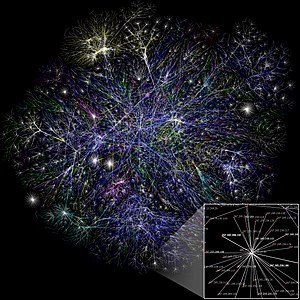Since starting the readings for the mooc I am doing "Openness in Education" I have started to see a broader perspective
 |
| This image was selected as a picture of the week on the Farsi Wikipedia for the 13th week, 2011. (Photo credit: Wikipedia) |
"COMMONS-BASED peer production is a socio-economic system of
production that is emerging in the digitally networked environment.
Facilitated by the technical infrastructure of the Internet, the hallmark of this
socio-technical system is collaboration among large groups of individuals,
sometimes in the order of tens or even hundreds of thousands, who cooperate
effectively to provide information, knowledge or cultural goods without relying
on either market pricing or managerial hierarchies to coordinate their common
enterprise."
https://apps.lis.illinois.edu/wiki/download/attachments/15979/Benker+et+al+(Peer-production+and+virtue).pdf
"Like many of the bedrock technologies that have come to define the digital age, the Internet was created by — and continues to be shaped by — decentralized groups of scientists and programmers and hobbyists (and more than a few entrepreneurs) freely sharing the fruits of their intellectual labor with the entire world. Yes, government financing supported much of the early research, and private corporations enhanced and commercialized the platforms. But the institutions responsible for the technology itself were neither governments nor private start-ups. They were much closer to the loose, collaborative organizations of academic research. They were networks of peers."
http://www.nytimes.com/2012/09/23/magazine/the-internet-we-built-that.html?pagewanted=1&_r=1
"Going forward, IA need to ensure that the key players in Washington realize that the people building the modern Web do not consider themselves to be part of the 47 percent, 53 percent, 99 percent or 1 percent. When our politicians talk about entrepreneurship, innovation and competitiveness these days, they’re often really thinking about behemoth corporations and the types of tax cuts and politically-motivated moves that will turbo-charge the next quarter. Instead, they should be thinking long-term and talking about keeping it cool for kids to finish school, study programming and make their first job working at a startup with the potential to change the world. We built the Internet — let’s not forget it."
http://www.washingtonpost.com/blogs/innovations/post/the-internet-we-built-it/2012/09/20/33d939d2-032d-11e2-9132-f2750cd65f97_blog.html
"But he bottom line question he asks is this: At what point should publishers expose the book’s entire content to all the search engines? And while he offers no easy one-size-fits-all answer, he does point to the example of Craig Mod, whose book Art Space Tokyo has been published in digital editions across multiple platforms, “within two distinct ecosystems:”
1. open [the web]
2. and closed [iBooks, Kindle, and other ereaders]
http://publishingperspectives.com/2012/09/should-you-expose-all-your-books-content-to-search-engines/

No comments:
Post a Comment